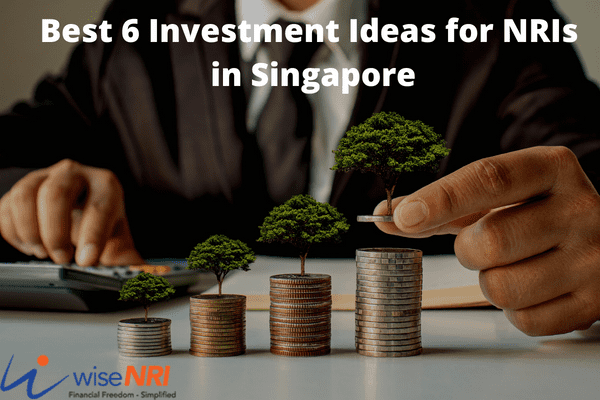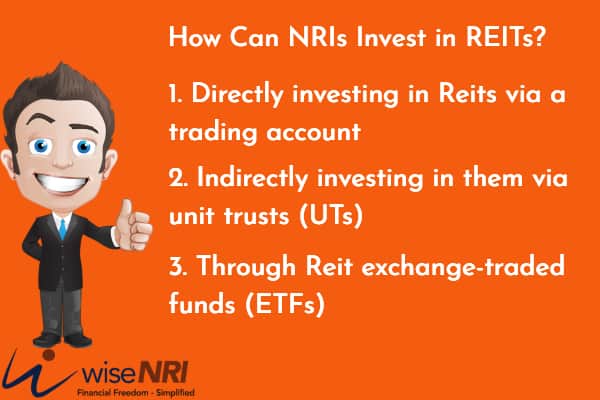It is important to convert your earnings into assets that can create more wealth for you so that you can achieve your short-term and long-term financial goals. Irrespective of your residential status, you should have a comprehensive and timely investment strategy that will help you to achieve a more secure financial future.

Must Check –10 Best NRI Investment Options in India
Singapore is a developed country that has low taxes but a high cost of living. As an NRI living in Singapore, you have to ensure that you manage your money well. Let us look at the Investment for NRIs in Singapore –
1. Central Provident Fund (CPF) and Supplementary Retirement Schemes (SRS)
It is an employment-based savings scheme. Employees and employers make defined contributions to the CPF funds. These contributions are accumulated in three accounts:
- Ordinary Account (OA)
- MediSave Account (MA)
- Special Account (SA)
When the contributor becomes 55 years old, a Retirement Account (RA) is opened for them.
The interest rates as of May 2022 are as follows –
| Ordinary Account (OA) | MediSave Account (MA) | Special Account (SA) | Retirement Account (RA) |
| 2.5%- 3.5% | 4%-5% | 4%-5% | 4%-5% |
Contributors also can make cash top-ups to get higher retirement payouts and invest in a wide range of investments to grow the retirement fund.
You can find more details here.
The Supplementary Retirement Scheme (SRS) is a voluntary scheme over and above the CPF. People (Singapore citizens, Permanent Residents and Foreigners can contribute to SRS). It is a tool for individuals to save for retirement. Contributions to SRS are eligible for tax relief. Investment returns are tax-free before withdrawal, and only 50% of the withdrawals from SRS are taxable at retirement.

You can find more details about – Singapore CPF
2. Singapore Savings Bonds
These bonds are backed by the Singapore government, which has a strong credit rating. They are safe and stable and offer higher interest than bank deposits. For example, the bond issued in May 2022 is expected to give an average annual interest rate of 2.09%. One savings bond will be issued every month and an NRI who is over 18 years old, and has a bank account with one of the local banks specified and a CDP account or an SRS account can apply for them.
You can invest in SSB for as little as $500 and up to a cap of $200,000 per person, which makes it attractive to people who can invest lower amounts. Though the investment period is ten years, you can redeem without any fees or penalties whenever required.
The downside of these bonds is that the returns will not beat inflation and there is a limit on the maximum amount that can be invested.
3. Real Estate Investment Trusts (REITs)
The real estate market in Singapore is highly regulated and therefore is a dependable investment avenue. Instead of buying a property that can get quite expensive in Singapore, you can invest in REITs. They are investment plans that own and invest in a diversified portfolio of properties that generate income.
REITs are listed on the Singapore Exchange, and you can invest in REITs either
- Directly investing in Reits via a trading account
- Indirectly investing in them via unit trusts (UTs)
- Through Reit exchange-traded funds (ETFs)
Since the portfolio is diversified, the risk is reduced.
4. Unit Trusts
A unit trust is a fund where investments of multiple investors are pooled together and managed by a fund manager. The fund manager invests the corpus across various investment avenues depending on the type of unit trust and its objectives. The advantages are that you can select a unit trust based on your risk tolerance and investment objective, and the investment will be managed by a professional. On the other hand, you will not have a say in the individual investments made, and the returns are not guaranteed. Also, not all unit trusts are listed, and those that are listed may not always have active buyers and sellers, which means you have to deal with liquidity risk.

Must check – NRI Investments in Commercial Property
5. ETFs
ETFs are pooled investments that are listed on stock exchanges. They track the performance of a particular index and seek to replicate the returns of that index. Since they are listed, individuals can buy and sell them on the exchange by opening a stock brokerage account. There are over 30 indexes listed on the Singapore Stock Exchange (SGX). The advantages of investing in ETFs are that you can invest in the market without the kind of research involved while investing in specific stocks and take advantage of market linked returns. The cost of investment is also lower as compared to investments in Unit Trusts or REITs. On the other hand, you cannot control the stocks you invest in or divest from, and there is no guarantee of returns.
Check – Monthly investment options for NRIs
6. Stocks
With inflation on the rise, we have to seek investments that generate returns that beat inflation. Historically, stocks have allowed investors to generate higher returns than most other investment avenues. When you invest in stocks, you have the opportunity to increase your wealth as the value of the stocks go higher and you can earn dividends increasing your total income. But investing in stocks requires careful research and analysis. You must also have the requisite risk capacgiy and risk tolerance which means you must have the financial capacity to invest and have the stomach to face market volatility. You can invest in stocks in Singapore by opening a brokerage account. You can open a brokerage account with banks like DBS, OCBC, etc. or use a trading platform like StashAway, SAXO or Tiger Brokers.
Hope this brief overview of the various investment options in Singapore helps you be aware of your investment options, and you build a diversified investment portfolio that can grow your wealth with minimum risk.
Please add in the comment section if you would like to suggest something else in Singapore for NRIs.
